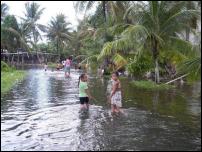 Confusion reigns in Papua New Guinea as conflicting rumours abound whether long-standing Prime Minister Michael Somare is about to resign. Port Moresby’s Courier Mail said Somare is planning to relinquish the party leadership by the time of the National Alliance party's national convention on 14 August. The paper quote Deputy PM Don Polye who said Somare made his decision during a party caucus meeting last week. Polye said Somare would reshuffle the government in the next two weeks and would step aside either before or at the convention.
Confusion reigns in Papua New Guinea as conflicting rumours abound whether long-standing Prime Minister Michael Somare is about to resign. Port Moresby’s Courier Mail said Somare is planning to relinquish the party leadership by the time of the National Alliance party's national convention on 14 August. The paper quote Deputy PM Don Polye who said Somare made his decision during a party caucus meeting last week. Polye said Somare would reshuffle the government in the next two weeks and would step aside either before or at the convention. However, the ABC is reporting National Alliance party spokesperson Stephen Pokawin has denied the newspaper’s report. All Pokawin would confirm was that the party's leadership would be the main topic of discussion at the convention with Polye ready to make a bid for the top job. Pokawin, who is the National Alliance Party's general secretary, says the party constitution prevents Somare from contesting the leadership for a third time, having won elections for the National Alliance in 2002 and again in 2007. Somare was also the country's first PM in 1975 and won again in 1982. The next election is due in 2012.
Somare’s recent actions show little sign of a man wanting to step aside any time soon. Last week he chose eight new Government ministers after three key figures including deputy Puka Temu left to form a new party on Monday. Their aim was to move a vote of no confidence and form a new government. Polye was promoted to take Temu’s job and with his help Somare hung on to defeat the no confidence motion 64-45 to remain Prime Minister.
Badly shaken by the vote, Somare adjourned the parliament for four months on Wednesday. The Speaker Jeffrey Nape adjourned the house until mid November despite the opposition's claim it had enough votes to stop the adjournment. Nape, an ally of Somare refused to count the “no” votes and called for the adjournment. The decision caused an uproar in the parliament with cries of “dictatorship”. This angered Somare so much he rose across the floor and pointed at Opposition member Sam Basil shouting “Bai mi kilim yu autsait” which translated meant “I will kill you outside”. Somare was restrained by his son Arthur.
With Michael Somare now 74 years old, many see Arthur as his logical groomed successor. The National editorialised that Arthur is the most senior MP from the Mamose (a region which covers Sepik, Madang and Morobe). The National said the son lives in the shadow of his famous father and won’t emerge till “the shadow moves on”. But the National also acknowledges this outcome would case “much disgruntlement, particularly from the Mamose faction that feels it is past time power were not centralised in the Sepik or with the Somare family.”
New Deputy Don Polye, meanwhile, draws his support from the Central Highlands in the province of Enga. It appears Polye reneged on a deal with long standing deputy Puka Temu for them to both walk out on Somare’s Government. Polye was rewarded with the deputy role, a role The Australian’s Asia-Pacific editor Rowan Callick believes will cement Somare in power till the 2012 election.
New Opposition leader Puka Temu is not so sure. This is the second time in two years Somare has adjourned parliament for several months to stop a no confidence vote and Temu has had enough. He is calling for Somare to quit now for the good of Papua New Guinea. "They call him the 'father of the nation' but he and his family are destroying the nation," he said. "They break laws, they treat parliament like a joke. Is this what PNG wants? No, they want an end to this." Temu said they would continue lobbying ministers and MPs who remain on the fence. "We have 45, all we need is 55," he said.










